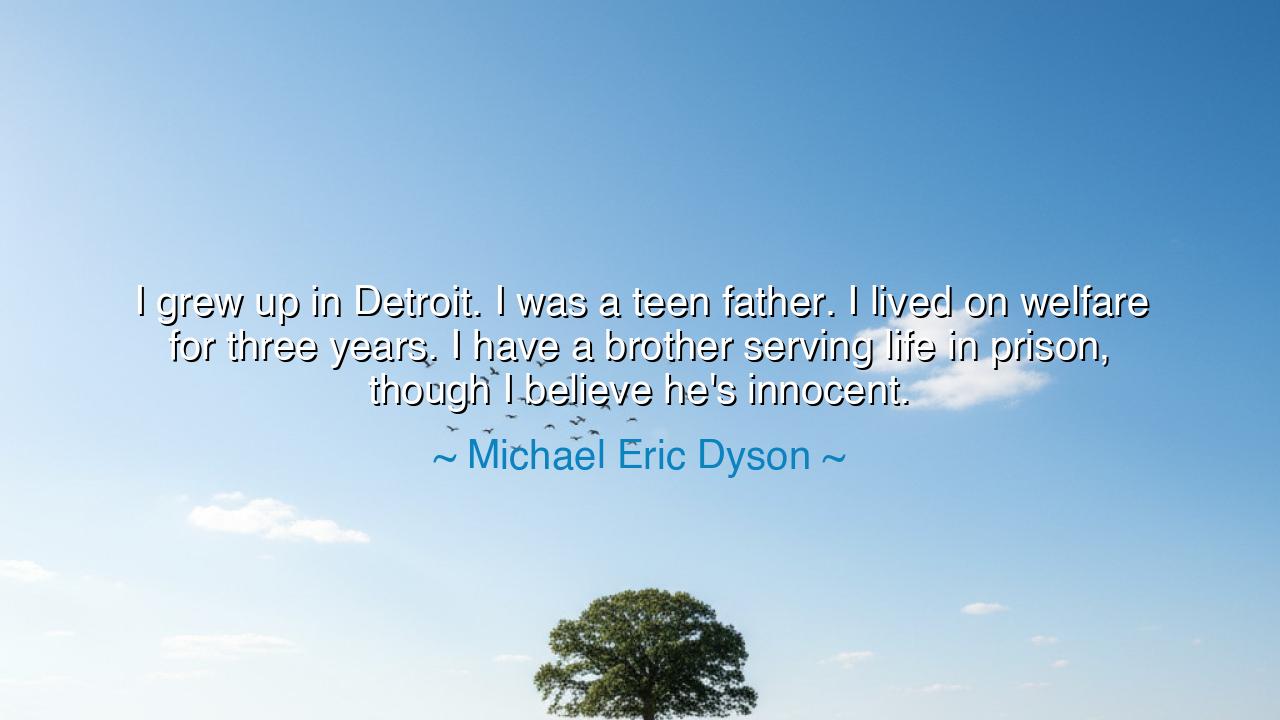
I grew up in Detroit. I was a teen father. I lived on welfare
I grew up in Detroit. I was a teen father. I lived on welfare for three years. I have a brother serving life in prison, though I believe he's innocent.






Michael Eric Dyson once spoke with raw truth: “I grew up in Detroit. I was a teen father. I lived on welfare for three years. I have a brother serving life in prison, though I believe he’s innocent.” These words are not decoration; they are the testimony of a soul forged in struggle. They speak of poverty, responsibility, injustice, and resilience, the forces that test a man before he has even fully become one. To hear them is to hear the echo of countless lives caught between hardship and hope, pain and perseverance.
The meaning of Dyson’s confession lies in the unveiling of reality. So often the world admires the scholar, the preacher, the public intellectual—but Dyson reminds us that behind such achievements lies the burden of beginnings. To be a teen father is to shoulder the weight of adulthood while still a child. To survive on welfare is to know dependence not as weakness, but as survival in a world of scarcity. To have a brother in prison is to carry grief and anger, mingled with the enduring hope for justice. In these words, Dyson shows that greatness is not born in comfort, but carved out of adversity.
The origin of such a story lies in the broader struggle of Black America, particularly in cities like Detroit, where deindustrialization, racial inequality, and economic decline struck hard. Entire communities lived in the shadow of abandoned factories and broken systems. In such soil, despair could have taken root. Yet from that same soil, voices like Dyson’s rose—voices that could speak both of suffering and of wisdom. His life became not only his own, but a mirror of the trials of his people, a record of resilience.
History is filled with men and women who rose from such crucibles. Consider Frederick Douglass, who was born into slavery, denied both freedom and education, yet taught himself to read and speak, eventually becoming one of the most powerful orators of his time. Douglass’s youth was scarred with injustice, yet from it he drew an unshakable voice that thundered against oppression. Dyson’s testimony, though in a different age, belongs to this same tradition: hardship as the forge of vision, suffering as the seed of eloquence.
The lesson here is not to romanticize pain, but to understand its alchemy. Life’s harshest blows can either shatter the spirit or awaken it. Dyson, confronted by fatherhood too young, by poverty, by the imprisonment of kin, did not surrender to bitterness. He chose instead to speak, to teach, to transform his wounds into wisdom. His words remind us that even in chains, even in hunger, even in grief, the soul can find a way to rise.
Let us also remember that his mention of a brother’s innocence imprisoned is more than personal sorrow—it is an indictment of a flawed justice system, one that has ensnared countless lives. This, too, is part of the lesson: resilience must not only be personal, but communal. It must call us to labor for justice, to lift others, to repair the broken structures that perpetuate suffering.
Practical wisdom flows from this: when life places upon your shoulders burdens too heavy for your years, do not despair. Seek strength in community, seek courage in perseverance, seek meaning in struggle. And when you have risen, as Dyson did, turn back to lift others who walk the same path. For survival is noble, but transformation is greater still.
So, children of tomorrow, carry Dyson’s words as both warning and encouragement: you may be born into hardship, but you are not condemned to remain there. Wear your struggles not as chains, but as armour, and let them teach you to stand firm, to speak truth, and to pursue justice with unyielding heart. For from Detroit’s ruins, from prison’s shadows, from welfare’s desperation, even from the trembling hands of a teen father, can rise a man whose voice echoes like thunder across generations.






AAdministratorAdministrator
Welcome, honored guests. Please leave a comment, we will respond soon